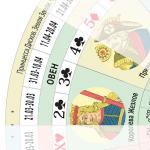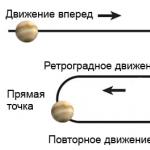Heroes in the work of the cherry orchard. Heroes of the play "The Cherry Orchard", as representatives of three different eras
All characters in the play "The Cherry Orchard" have great importance in the ideological and thematic context of the work. Even casually mentioned names carry a semantic load. For example, there are off-stage heroes (the Parisian lover, the Yaroslavl aunt), the very fact of whose existence already sheds light on the character and lifestyle of the hero, symbolizing an entire era. Therefore, in order to understand the author's idea, it is necessary to analyze in detail those images that implement it.
A.P. Chekhov loved his heroes, but he could not trust the future of Russia to any of them, even Petya Trofimov and Anya, the progressive youth of that time.
The heroes of the play, sympathetic to the author, do not know how to defend their life rights, they suffer or are silent. Ranevskaya and Gaev suffer because they understand that they cannot change anything in themselves. Their social status goes into oblivion, and they are forced to eke out a miserable existence on the last proceeds. Lopakhin suffers, as he realizes that he cannot help them in any way. He himself is not happy about buying a cherry orchard. No matter how hard he tries, he still will not become his rightful owner. That is why he decides to cut down the garden and sell the land, in order to later forget about it as a nightmare. But what about Petya and Anya? Doesn't the author place his hopes on them? Perhaps, but these hopes are very vague. Trofimov, by virtue of his nature, is not capable of taking any radical action. And without this, the situation cannot be changed. He is limited only to talk about a wonderful future and that's it. And Anya? This girl has a slightly stronger core than Petra. But due to her young age and uncertainty in life, changes should not be expected from her. Perhaps, in the distant future, when she sets all life priorities for herself, one can expect some action from her. In the meantime, she is limited to faith in the best and a sincere desire to plant a new garden.
Which side is Chekhov on? He supports each side, but in his own way. In Ranevskaya, he appreciates genuine female kindness and naivety, albeit seasoned with spiritual emptiness. In Lopakhin, he appreciates the desire for compromise and poetic beauty, although he is not able to appreciate the real charm of the cherry orchard. The Cherry Orchard is a member of the family, but everyone forgets about it together, while Lopakhin is not able to understand this at all.
The heroes of the play are separated by a huge abyss. They are not able to understand each other, as they are closed in the world of their own feelings, thoughts and experiences. However, everyone is alone, they have no friends, like-minded people, no real love. Most go with the flow without setting any serious goals. Besides, they are all unhappy. Ranevskaya is experiencing disappointment in love, life and her social supremacy, which seemed unshakable just yesterday. Gaev once again discovers that aristocracy of manners is not a guarantor of power and financial well-being. In front of his eyes, yesterday's serf takes away his estate, becomes the owner there even without the nobility. Anna is left without a penny for her soul, she does not have a dowry for a profitable marriage. Her chosen one, although he does not require it, has not yet earned anything himself. Trofimov understands what needs to be changed, but does not know how, because he has neither connections, nor money, nor position to influence something. They are left with only the hopes of youth, which are short-lived. Lopakhin is unhappy because he is aware of his inferiority, belittles his dignity, seeing that he is no match for any masters, although he has more money.
Interesting? Save it on your wall!A.P. Chekhov wrote his famous play "The Cherry Orchard" in 1903. In this play central location occupy not so much the personal experiences of the characters as an allegorical vision of the fate of Russia. Some characters personify the past (Ranevskaya, Gaev, Firs, Varya), others - the future (Lopakhin, Trofimov, Anya). The heroes of Chekhov's play "The Cherry Orchard" serve as a reflection of the society of that time.
Main characters
The heroes of Chekhov's "The Cherry Orchard" are lyrical characters with special features. For example, Epikhodov, who was constantly unlucky, or Trofimov, the "eternal student." Below will be presented all the heroes of the play "The Cherry Orchard":
- Ranevskaya Lyubov Andreevna, mistress of the estate.
- Anya, her daughter, 17 years old. Not indifferent to Trofimov.
- Varya, her adopted daughter, 24 years old. In love with Lopakhin.
- Gaev Leonid Andreevich, brother of Ranevskaya.
- Lopakhin Ermolai Alekseevich, a native of peasants, now a merchant. He likes Varya.
- Trofimov Pyotr Sergeevich, eternal student. Sympathizes with Anya, but he is above love.
- Simeonov-Pishchik Boris Borisovich, a landowner who constantly has no money, but he believes in the possibility of unexpected enrichment.
- Charlotte Ivanovna, the maid, loves to perform tricks.
- Epikhodov Semyon Panteleevich, clerk, unlucky person. Wants to marry Dunyasha.
- Dunyasha, the maid, considers herself like a lady. In love with Yasha.
- Firs, an old footman, constantly takes care of Gaev.
- Yasha, Ranevskaya's spoiled lackey.
The characters of the play
A.P. Chekhov always very accurately and subtly noticed in each character his features, whether it be appearance or character. This Chekhovian feature is also supported by the play "The Cherry Orchard" - the images of the characters here are lyrical and even a little touching. Each has its own unique features. Characteristics of the heroes of "The Cherry Orchard" can be divided into groups for convenience.

old generation
Ranevskaya Lyubov Andreevna appears as a very frivolous, but kind woman who cannot fully understand that all her money has run out. She's in love with some scoundrel who left her penniless. And then Ranevskaya returns with Anya to Russia. They can be compared with people who left Russia: no matter how good it is abroad, they still continue to yearn for their homeland. The image chosen by Chekhov for his homeland will be written below.
Ranevskaya and Gaev are the personification of the nobility, the wealth of past years, which at the time of the author began to decline. Both brother and sister may not be fully aware of this, but nevertheless they feel that something is happening. And by the way they begin to act, one can see the reaction of Chekhov's contemporaries - it was either a move abroad, or an attempt to adapt to new conditions.
Firs is the image of a servant who was always faithful to her masters and did not want any change in order, because they did not need it. If with the first main characters of The Cherry Orchard it is clear why they are considered in this group, then why can Varya be included here?
Because Varya occupies a passive position: she humbly accepts the emerging position, but her dream is the opportunity to go to holy places, and strong faith was characteristic of people of the older generation. And Varya, despite her stormy, at first glance, activity, does not take an active part in conversations about fate cherry orchard and does not offer any solutions, which shows the passivity of the rich class of that time.

Younger generation
Here the representatives of the future of Russia will be considered - these are educated young people who put themselves above any feelings, which was fashionable in the early 1900s. At that time, public duty and the desire to develop science were put in the first place. But one should not assume that Anton Pavlovich portrayed revolutionary-minded youth - it is rather an image of most of the intelligentsia of that time, which was engaged only in talking on high topics, putting itself above human needs, but was not adapted to anything.
All this was embodied in Trofimov - "an eternal student" and "a shabby gentleman", who could not finish anything, had no profession. Throughout the play, he only talked about various matters and despised Lopakhin and Varya, who was able to admit the thought of his possible romance with Anya - he is "above love."
Anya is a kind, sweet, still quite inexperienced girl who admires Trofimov and listens carefully to everything he says. She personifies the youth, who have always been interested in the ideas of the intelligentsia.
But one of the most striking and characteristic images of that era turned out to be Lopakhin - a native of peasants who managed to make a fortune for himself. But, despite the wealth, remained essentially a simple man. it active person, a representative of the so-called class of "kulaks" - wealthy peasants. Yermolai Alekseevich respected work, and work was always in the first place for him, so he kept postponing the explanation with Varya.
It was during that period that the hero of Lopakhin could have appeared - then this "risen" peasantry, proud of the realization that they were no longer slaves, showed a higher adaptability to life than the nobles, which is proved by the fact that it was Lopakhin who bought Ranevskaya's estate.
Why was the characterization of the heroes of "The Cherry Orchard" chosen specifically for these characters? Because it is on the characteristics of the characters that their internal conflicts will be built.

Internal conflicts in the play
The play shows not only the personal experiences of the heroes, but also the confrontation between them, which makes it possible to make the images of the heroes of "The Cherry Orchard" brighter and deeper. Let's consider them in more detail.
Ranevskaya - Lopakhin
Most main conflict located in a pair of Ranevskaya - Lopakhin. And it is due to several reasons:
- belonging to different generations;
- opposition of characters.
Lopakhin is trying to help Ranevskaya save the estate by cutting down a cherry orchard and building dachas in its place. But for Raevskaya, this is impossible - after all, she grew up in this house, and "dachas - it's so common." And in the fact that it was Ermolai Alekseevich who bought the estate, she sees in this a betrayal on his part. For him, buying a cherry orchard is a solution to his personal conflict: he, a simple man whose ancestors could not go beyond the kitchen, has now become the owner. And therein lies its main triumph.
Lopakhin - Trofimov
The conflict in a pair of these people is due to the fact that they have opposing views. Trofimov considers Lopakhin an ordinary peasant, rude, limited, who is not interested in anything but work. The same one believes that Pyotr Sergeevich is simply wasting his mental abilities, does not understand how one can live without money, and does not accept the ideology that a person is above everything earthly.
Trofimov - Varya
The confrontation is built, most likely, on personal rejection. Varya despises Peter because he is not busy with anything, and fears that with the help of his smart speeches, Anya will fall in love with him. Therefore, Varya tries in every possible way to prevent them. Trofimov, on the other hand, teases the girl "Madame Lopakhina", knowing that everyone has been waiting for this event for a long time. But he despises her because she equated him and Anya with herself and Lopakhin, because they are above all earthly passions.
So, the above was briefly written about the characters of the heroes of "The Cherry Orchard" by Chekhov. We have described only the most significant characters. Now we can move on to the most interesting - the image of the protagonist of the play.

The protagonist of The Cherry Orchard
The attentive reader has already guessed (or guesses) that this is a cherry orchard. In the play, he personifies Russia itself: its past, present and future. Why is the garden itself the main character of The Cherry Orchard?
Because it is to this estate that Ranevskaya returns after all the misadventures abroad, because it is because of him that the heroine’s internal conflict escalates (fear of losing the garden, awareness of her helplessness, unwillingness to part with it), and a confrontation arises between Ranevskaya and Lopakhin.
The Cherry Orchard also helps to resolve Lopakhin's internal conflict: he reminded him that he was a peasant, an ordinary peasant who miraculously was able to get rich. And the opportunity to cut down this garden, which appeared with the purchase of the estate, meant that now nothing else in those parts could remind him of his origin.
What did the garden mean for heroes
For convenience, you can write the ratio of the characters to the cherry orchard in the table.
| Ranevskaya | Gaev | Anya | Varya | Lopakhin | Trofimov |
| The garden is a symbol of prosperity, well-being. The happiest childhood memories are associated with it. Characterizes her attachment to the past, so it is difficult for her to part with it | Same attitude as sister | The garden for her is an association with sometimes childhood, but due to her youth she is not so attached to it, and still there are hopes for a brighter future | The same association with childhood as Anya. At the same time, she is not upset about his sale, as now she can live the way she wants. | The garden reminds him of his peasant origins. Knocking him out, he says goodbye to the past, at the same time hoping for a happy future | Cherry trees are for him a symbol of serfdom. And he believes that it would even be right to abandon them in order to free themselves from the old way of life. |

The symbolism of the cherry orchard in the play
But how then is the image of the protagonist of "The Cherry Orchard" connected with the image of the Motherland? Through this garden, Anton Chekhov showed the past: when the country was rich, the estate of the nobility was in its prime, no one thought about the abolition of serfdom. In the present, a decline in society is already outlined: it is divided, landmarks are changing. Russia was already on the threshold new era, the nobility became smaller, and the peasants gained strength. And the future is shown in Lopakhin's dreams: the country will be ruled by those who are not afraid to work - only those people can lead the country to prosperity.
The sale of Ranevskaya's cherry orchard for debts and the purchase by Lopakhin is a symbolic transfer of the country from the wealthy class to ordinary workers. By debt here is meant a debt for how to deal with them. for a long time treated the owners as they exploited the common people. And the fact that power in the country passes to the common people is a natural result of the path that Russia has taken. And the nobility had to do what Ranevskaya and Gaev did - go abroad or go to work. And the younger generation will try to fulfill the dreams of a brighter future.

Conclusion
After such a small analysis of the work, one can understand that the play "The Cherry Orchard" is a deeper creation than it might seem at first glance. Anton Pavlovich was able to masterfully convey the mood of the society of that time, the position in which it was. And the writer did this very gracefully and subtly, which allows this play to remain loved by readers for a long time.
In his play "The Cherry Orchard" A.P. Chekhov gives vivid characteristics to all the heroes, dividing them, conditionally, into people of the present, past and future. These characters not only by their deeds, but most importantly by their words, speak about themselves. So, one of the main characters of the action, Lyubov Andreevna Raevskaya. She is a fashionably dressed woman. Having squandered her fortune, she returned from Europe to sell an estate with a cherry orchard.
Lyubov Andreevna is smart, very kind and absent-minded. She caresses everyone and loves her daughters Anya and foster Varya very much. Ranevskaya is responsive and generous person, she does not know how to save at all, although she knows very well how difficult the financial condition of their family is. Her brother is Leonid Andreevich Gaev. He is not much different from his sister and also, completely, does not know how to use money. He eats and drinks a lot and constantly sucks on lollipops. He talks a lot, often nonsense, but he likes to make solemn speeches.
This is a narrow-minded, lazy and unbusinesslike person, And, most importantly, he is not a man - his word. A personality of a different format, which will soon replace the short-sighted Ranevskaya and Gaev, will be Ermolai Alekseevich Lopakhin. This is a new class. He is a rich merchant who, from the son of a serf, turned into an entrepreneur and merchant. Lopakhin has no education, but he is smart by nature. Humble and practical person. He is in love with Varya, but he does not dare to propose to her. "Eternal" student Petr Trofimov former teacher the drowned son of Ranevskaya. He is poor and cannot graduate from university.
He doesn't do anything serious. He has a pure soul, but many consider him an eccentric. He is a proud and shy person. He is friends with Anya Ranevskaya, freely expressing his thoughts about freedom and happiness with her. Anechka, Lyubov Andreevna's own daughter. A smart and well-educated girl, but almost still a child. She is not afraid of change and strives for it. She is a dreamer. Anya wants to study and work, bringing joy to people. Varya, adopted daughter of Ranevskaya.
She matured early and is forced to take on her shoulders the whole burden of maintaining the estate. Knowing the price of every penny, she does not waste anything. She likes Lopakhin, but his timidity brings young people only sadness. Varya, due to lack money will go serve as a housekeeper to rich people. Life does not spoil her very much, but she is a kind and attentive girl. The servants who surround Raevskaya and Gaev are mostly kind and nice people. For example, Firs, served in their house all his life.
This is a faithful and reliable servant, but he is already very old, at the end of the play, he will die of grief, abandoned by everyone. And here is the young footman Yasha, "a rogue and a drunkard." He flirts with the maids, promising them all sorts of gifts, but lies and "plays" with feelings. He asks Raevskaya to leave with her, as a servant, abroad. Nothing keeps him here. Russia is not dear to him. Lyubov Andreevna's neighbor, Simeonov, Boris Borisovich Pishchik, an impoverished nobleman. He spends all his energy trying to find someone to borrow money from. Boris Borisovich suffers from gout. He is frivolous and comical.

Now they are reading:
- The plot of the novel A Hero of Our Time
Lermontov Mikhail Yurievich, created a novel called "A Hero of Our Time" in early 1841, he is the very first in the lyrical and psychological direction.
- I dedicated the lyre to my people - composition by Nekrasov
In today's essay, we will talk about the folk poet Nikolai Alekseevich Nekrasov in his work, well-chosen, and compatible, and how vividly he portrayed the people and life in his works.
- Love in Oblomov's life essay
As soon as the novel "Oblomov" was published, it immediately aroused a flurry of reasoning, questions, and disputes among critics and specialists in the field of literature. However, one cannot fail to say that the novel was recognized and loved by many people.
- Composition Childhood of Alyosha Peshkov
Alyosha Peshkov was born into a poor bourgeois family. The boy's father died early, having contracted cholera from his son. His mother returned to her father, who in the past was a barge hauler, and later opened a dyeing workshop. He was assisted by his two married sons,
- Composition Ostap and Andriy Brothers and Enemies Grade 7, Grade 8
The events described by N.V. Gogol, underlie the Cossack uprising of 1637-1638, suppressed by Hetman N. Pototsky. During these times, the Commonwealth resolutely sought to convert the part of the territories under its control to Catholicism.
- The idea of the novel Oblomov essay
The novel by I. Goncharov "Oblomov" was published in the middle of the 19th century - a time when not only serfdom, but the whole society experienced acute crisis. It was an era of change, the need for which was recognized by all progressive minds. But there was another
"The Cherry Orchard" - the final work of A.P. Chekhov, called a comedy by the author himself and rightly referred by critics and connoisseurs of literature to the genre of tragicomedy and drama.
The author touched upon the deep topic of change, the transition from one era to another, the impoverishment of the nobles and the beginning of the era of entrepreneurship. In the play itself, he pays a lot of attention psychological state heroes who lost their home.
The work is partly biographical, since a similar event occurred in Anton Pavlovich's childhood - his family's house and his father's shop were also sold for debts.
As for the characters, Chekhov's plays are distinguished mainly by the fact that the author does not trace the division of heroes into positive and negative, there are also no main and secondary ones. In the play "The Cherry Orchard" the main characters can be symbolically divided into personifying the past, present and future.
The past, in this case, is personified by: the landowner Ranevskaya Lyubov Andreevna, her brother Gaev Leonid Andreevich, their old servant Firs and the neighbor-landowner Simeonov-Pishchik Boris Borisovich. These are the nobles who own the estate and their servant, who do not yet understand that times are changing and it can be different. They are accustomed to the estate, to the status, frivolous and, in part, rash acts, extravagance and carefree behavior.
The present belongs to the merchant Ermolai Alekseevich Lopakhin, who keeps up with the times and looks at the world in a completely different way, he understands that the nobility is behind and now it is not worth cherishing large property without being able to support it. He can boast of neither pedigree nor education, but he has a flair for all kinds of money transactions, which helped him to earn quite a large fortune.
The future is shown in the face of the daughter of the landowner Anna and the eternal student Trofimov Peter Sergeevich, who, in turn, were delighted with the sale of the estate. After all, now they are free to do as they please and not be tied to the estate.
Life is changing and it's for the better.
In addition, the following characters are not so minor in the play:
Varya is the adopted daughter of the landowner Raevskaya L.A., who was in the role of a housekeeper on the estate. Repeatedly, there is talk of marrying her off to Lopakhin, to whom she is not very interested. Varya herself, after the sale of the estate, got a job as a housekeeper in a neighboring estate.
Dunyasha, a servant of Raevskaya, was with her in Paris, trying to behave like a young lady and not indifferent to Yasha, dreaming of extraordinary love.
Epikhodov Semyon Panteleevich - a clerk in love with Dunyasha.
Yasha is a young lackey who was also with the landowner abroad, after which he became proud, behaves very impudently even towards the owners.
Charlotte Ivanovna is a governess who spent all her childhood in the circus, knows a lot of tricks and tricks, constantly demonstrates them, and complains of loneliness.
The social statuses of the heroes of the play - as one of the characteristics
In the final play A.P. Chekhov's "The Cherry Orchard" there is no division into main and secondary characters. They are all the main, even seemingly episodic roles are of great importance for revealing the main idea of the whole work. The characterization of the heroes of The Cherry Orchard begins with their social representation. After all, in people's heads social status already leaving an imprint, and not only on stage. So, Lopakhin, a merchant, is already associated in advance with a noisy and tactless huckster, incapable of any subtle feelings and emotions, but Chekhov warned that his merchant is different from typical representative this class. Ranevskaya and Simeonov-Pishchik, designated as landowners, look very strange. After all, after the abolition of serfdom social statuses landlords were left in the past, since they no longer corresponded to the new social order. Gaev is also a landowner, but in the minds of the characters he is "Ranevskaya's brother", which suggests some kind of lack of independence of this character. With the daughters of Ranevskaya, everything is more or less clear. Anya and Varya have an age indicated, showing that they are the youngest characters in The Cherry Orchard. The age is also indicated for the oldest actor- Firs. Trofimov Petr Sergeevich is a student, and this is some kind of contradiction, because if a student, then he is young and it seems too early to ascribe a patronymic, but meanwhile it is indicated.
Throughout the entire action of the play The Cherry Orchard, the characters are fully revealed, and their characters are outlined in a form typical for this type of literature - in speech characteristics given by themselves or by other participants.
Brief characteristics of the main characters
Although the main characters of the play are not singled out by Chekhov as a separate line, they are easy to identify. These are Ranevskaya, Lopakhin and Trofimov. It is their vision of their time that becomes the fundamental motive of the entire work. And this time is shown through the attitude to the old cherry orchard.
Ranevskaya Lyubov Andreevna – main character"The Cherry Orchard" - in the past, a wealthy aristocrat, accustomed to live at the behest of her heart. Her husband died quite early, leaving a lot of debts. While she indulged in new feelings, her little son tragically died. Considering herself guilty of this tragedy, she runs away from home, from her lover abroad, who, among other things, followed her and literally plundered her there. But her hopes for finding peace did not come true. She loves her garden and her estate, but she cannot save it. It is unthinkable for her to accept Lopakhin’s proposal, because then the centuries-old order in which the title of “landowner” is passed down from generation to generation carrying the cultural and historical heritage, inviolability and confidence in the worldview will be violated.
Lyubov Andreevna and her brother Gaev are characterized by all the best features of the nobility: responsiveness, generosity, education, a sense of beauty, the ability to sympathize. However, in modern times, all of them positive traits are not needed and are turned over in the opposite direction. Generosity becomes irrepressible squandering, responsiveness and the ability to sympathize turn into slobbering, education turns into idle talk.
According to Chekhov, these two heroes do not deserve sympathy and their feelings are not as deep as it might seem.
In The Cherry Orchard, the main characters talk more than they do, and only person- action is Lopakhin Ermolai Alekseevich, central character, according to the author. Chekhov was sure that if his image failed, then the whole play would fail. Lopakhin is marked as a merchant, but it would suit him better modern word"businessman". The son and grandson of serfs became a millionaire thanks to his intuition, determination and intelligence, because if he were stupid and not educated, how could he achieve such success in his business? And it is no coincidence that Petya Trofimov speaks of his subtle soul. After all, only Ermolai Alekseevich realizes the value of the old garden and its true beauty. But his commercial streak overdoes, and he is forced to destroy the garden.
Trofimov Petya- eternal student and " shabby gentleman". Apparently, he also belongs to noble family, but became, in fact, a homeless tramp, dreaming of the common good and happiness. He talks a lot, but does nothing for the speedy onset of a brighter future. He is also uncharacteristic deep feelings to the people around him and attachment to the place. He lives only in dreams. However, he managed to captivate Anya with his ideas.
Anya, daughter of Ranevskaya. Her mother left her in the care of her brother at the age of 12. That is, in adolescence, so important for the formation of personality, Anya was left to her own devices. She inherited best qualities that are characteristic of the aristocracy. She is youthfully naive, perhaps that is why she was so easily carried away by Petya's ideas.
Brief characteristics of minor characters
The characters in the play "The Cherry Orchard" are divided into main and secondary only by the time of their participation in the actions. So Varya, Simeonov-Pishchik Dunyasha, Charlotte Ivanovna and the lackeys practically do not talk about the estate, and their worldview is not revealed through the garden, they are, as it were, cut off from it.
Varya- adopted daughter of Ranevskaya. But in essence, she is the housekeeper on the estate, whose duties include taking care of the masters and servants. She thinks at the everyday level, and her desire to devote herself to serving God is not taken seriously by anyone. Instead, they try to marry her off to Lopakhin, to whom she is indifferent.
Simeonov-Pishchik- the same landowner as Ranevskaya. Constantly in debt. But his positive attitude helps to overcome him. difficult situation. So, he does not hesitate a bit when an offer is made to lease his lands. Thus solving their financial difficulties. He is able to adapt to a new life, unlike the owners of the cherry orchard.
Yasha- A young lackey. Having been abroad, he is no longer attracted by his homeland, and even his mother, who is trying to meet him, is no longer needed by him. his arrogance main feature. He does not respect the owners, he has no attachment to anyone.
Dunyasha- a young windy girl who lives one day and dreams of love.
Epikhodov- the clerk, he is a chronic loser, which he knows very well. In fact, his life is empty and aimless.
Firs- most old character for whom the abolition of serfdom was the greatest tragedy. He is sincerely attached to his masters. And his death in an empty house to the sound of a garden being cut down is very symbolic.
Charlotte Ivanovna- a governess and a circus performer in one person. The main reflection of the declared genre of the play.
The images of the heroes of The Cherry Orchard are combined into a system. They complement each other, thereby helping to reveal main theme works.
Artwork test






